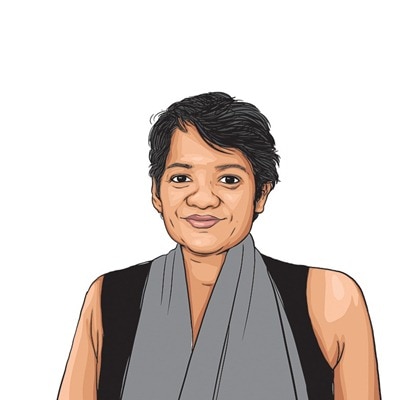Opinion Petitioners in marriage equality case: Courage to live your truth will result in slow but sure change
As we look back, we see those who have always stood behind us — our families, friends, colleagues, community, lawyers, and we hope, our country
 Pride march organized by Lakshya Trust for LGBTQ community in Vadodara on Saturday. (Express photo by Bhupendra Rana)
Pride march organized by Lakshya Trust for LGBTQ community in Vadodara on Saturday. (Express photo by Bhupendra Rana) “inquilab aa egā raftār se māyūs na ho/ bahut āhista nahīñ hai, jo bahut tez nahīñ/”
(revolution will come quickly, don’t be despondent/one that is not too slow, not too fast/)
— Ali Sardar Jafri
It has been over five months since the Supreme Court hearings on marriage equality in which we are one among many petitioners. A recurring argument that arose both within and outside the courtroom was whether Indian society was ready for marriage equality. We cannot claim to know the answer to this but we can offer our experience over the last five months to perhaps further this debate.
Though the intervening months felt like the calm after the storm, we had a few thundershowers of our own. In what is universally recognised as a significant and difficult event, we moved homes. We have moved many homes in our 11-year-relationship but this one felt different. We have always been in a city surrounded by our friends and colleagues. For the first time, we were in a new city not knowing what to expect. Curious neighbours, judgemental building uncles, cooks who give us the side eye? But overwhelmingly, our family of four, including our child and dog, was welcomed by our new neighbours and community wholeheartedly. Without any legal recognition, one of us still lives in this home as a tenant of the other. But socially we are recognised as the family unit that we are.
In what is also universally recognised as significant and perhaps more difficult, our son started school. After lots of research and planning, we selected a school that we felt best matched our values. But we were the first same-sex couple to enroll their child there and we were hesitant as we scratched out “Father’s Name” to write one of ours in their admission form.
Six months into his school life though, our son has learned to hold his family up with pride just like his classmates. During a recent school drop, we saw our son and his friends huddled around an art board where each child’s family tree was displayed. This little trio of toddlers were deep in discussion with one of our son’s friends explaining to the others: “Kisi kisi ke ghar main mama papa hote hain, kisi kisi main mama mama aur kisi kisi main papa papa.” (Some homes have a mother and a father, some have two mothers and some two fathers).
To which our son added, “Kisi kisi ghar main Bombil bhi hota hain.” (Some homes have Bombil, too). Bombil is our dog.
These children are the society of tomorrow and that they will grow up without a bias or inherent homophobia means everything to us. As does the fact that the school management and fellow parents are complicit in effecting this change.
Finally, less significantly, but more visibly, we grew a year older during these months. If time, experience, and our new greys have taught us anything, it is that change is all around us. Since the hearings, we have got to know many other petitioners and learned of their lives leading up to the petition. These are a diverse set of people whose commonality is not simply that they are LGBTQIA+ persons but that they are all thriving parts of Indian society. By living their lives with pride and dignity, they change society one day at a time.
We are not blind to the fact that there are many Indians who still do not accept non-heterosexual relationships and strongly oppose their inclusion in the institution of marriage. But our biggest learning has been this: So long as there is a compassionate and continuous process of engagement, we will get there. Revolutions take many forms and the courage to live your truth will result in slow but sure change.
This group of petitioners and all the lawyers representing them are testament to this. To see the best legal minds of our country argue for equality and inclusion has been humbling.
To be sure, there is still a lot of ground to be covered to make our country equitable and safe for LGBTQIA+ persons. But there are many good people fighting for this to happen both socially and legally. And so, for us and especially for young LGBTQIA+ Indians, there is help and hope for a life made better with rights and safeguards.
“When we filed our petition before the Supreme Court, we did so nervously, with what felt like the weight of the world on our shoulders. We were only looking ahead to what we hoped was a better future. The verdict has not been what we hoped for but as we write this, we are now able to look back and see the might of what has always stood behind us — our families, friends, colleagues, community, lawyers and we hope, our country. And along with them, we are ready for whatever tomorrow may bring.”
Anand and Dias are among the couples petitioning Supreme Court to legalise same-sex marriage in India. SC is scheduled to pronounce its judgment today






